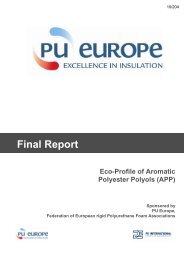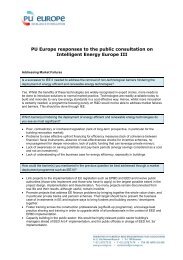Multiple benefits of renovation in buildings - PU Europe
Multiple benefits of renovation in buildings - PU Europe
Multiple benefits of renovation in buildings - PU Europe
Create successful ePaper yourself
Turn your PDF publications into a flip-book with our unique Google optimized e-Paper software.
<strong>Multiple</strong> <strong>benefits</strong> <strong>of</strong> <strong>in</strong>vest<strong>in</strong>g <strong>in</strong> energy<br />
efficient <strong>renovation</strong> <strong>of</strong> build<strong>in</strong>gs<br />
Table A.7 Benefits to society and public f<strong>in</strong>ances – energy sav<strong>in</strong>g<br />
Overall <strong>benefits</strong> to society<br />
Sav<strong>in</strong>gs from reduced energy consumption <strong>in</strong><br />
residential build<strong>in</strong>gs<br />
Sav<strong>in</strong>gs from reduced energy consumption <strong>in</strong><br />
non-residential build<strong>in</strong>gs<br />
Value <strong>of</strong> energy sav<strong>in</strong>gs -<br />
Low EE scenario (bn EUR)<br />
34.5 54.0<br />
31.1 40.3<br />
Total 66 94<br />
Energy sav<strong>in</strong>gs - High EE<br />
scenario (bn EUR)<br />
Benefits to public f<strong>in</strong>ances (sub section<br />
<strong>of</strong> <strong>benefits</strong> to society)<br />
Sav<strong>in</strong>gs from reduced energy consumption <strong>in</strong><br />
residential build<strong>in</strong>gs- publicly owned<br />
Sav<strong>in</strong>gs from reduced energy consumption <strong>in</strong><br />
non-residential build<strong>in</strong>gs- publicly owned<br />
Value <strong>of</strong> energy sav<strong>in</strong>gs -<br />
Low EE scenario (bn EUR)<br />
2.4 3.8<br />
9.0 11.7<br />
Total 11 15<br />
Note:<br />
These estimates does not <strong>in</strong>clude the rebound effect<br />
Energy sav<strong>in</strong>gs - High EE<br />
scenario (bn EUR)<br />
Source: Copenhagen Economics, based on Data Base on Energy Sav<strong>in</strong>g Potentials and BPIE (2011).<br />
This calculation assumes that the energy consumption <strong>in</strong> dwell<strong>in</strong>gs/build<strong>in</strong>gs is the same,<br />
irrespective <strong>of</strong> whether the build<strong>in</strong>gs are publicly or privately owned. For residential<br />
dwell<strong>in</strong>gs this is most likely quite accurate; however for non-residential build<strong>in</strong>gs the<br />
assumption may not be 100 per cent precise. A hospital e.g. will most likely not use the<br />
same amount <strong>of</strong> energy as a restaurant or a hotel. However, it is not obvious that the results<br />
are biased <strong>in</strong> one particular direction as a result <strong>of</strong> this.<br />
In addition, we assume that public budgets will be improved with the value <strong>of</strong> the energy<br />
sav<strong>in</strong>gs. In reality, energy sav<strong>in</strong>gs achieved <strong>in</strong> e.g. a public school may not be channelled<br />
back <strong>in</strong> the general government’s budget. However, we still consider this as an overall<br />
sav<strong>in</strong>g for the public, as the benefit will either accrue to the general government budget or<br />
to the local government entity (the school) and materialise <strong>in</strong> better quality <strong>of</strong> the provided<br />
services. The same reason<strong>in</strong>g holds <strong>in</strong> the residential sector, where the rent <strong>in</strong> public<br />
owned apartments can be <strong>in</strong>creased to extract the economic benefit, without mak<strong>in</strong>g the<br />
tenant worse <strong>of</strong>f.<br />
A.6 Reduced tax <strong>in</strong>come from energy taxation<br />
All EU Member States levy taxes or excise duties on energy consumption. Hence, when<br />
<strong>Europe</strong>an energy consumption is reduced, so is government tax revenue from energy<br />
taxation. We assess the governments’ loss <strong>of</strong> tax revenue by look<strong>in</strong>g at the taxation on<br />
electricity consumption, and the excise duty on natural gas and coal used for heat<strong>in</strong>g purposes.<br />
There are vast differences between the <strong>Europe</strong>an countries’ tax on electricity. In our calculations,<br />
we use an average tax measure on electricity <strong>in</strong> the EU which is €20 per MWh,<br />
cf. Table A.8.<br />
55
















